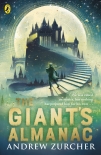The Giant's Almanac, Andrew Zurcher [accelerated reader books txt] 📗

- Author: Andrew Zurcher
Book online «The Giant's Almanac, Andrew Zurcher [accelerated reader books txt] 📗». Author Andrew Zurcher
Now the Riddler approached them where they huddled on the slope, and stood just behind the Professor. He drew himself to his full height, and shook his motley free of seawater. His thin hair he drew back from his face, and with an elaborate flourish he extended his arms, level from his shoulders, so that his body made a kind of cross behind Farzan. And he hung there, his eyes closed as if in sleep, listening.
‘If there was evil in the wazir’s heart, he told himself it was a righteous anger. He could not touch his rich and powerful brother, but the informer – a little child who had betrayed his confederacy and caused the ruin of his hopes, an innocent, and a bystander – this child he could punish. He was a little beggar boy, who had overheard some embassy or message, and by pulling on this thread had unclued the great knot of the conspiracy’s design. The wazir thought it was a small matter to ruin him, and, without his brother’s knowledge he caused him to be enslaved alongside the thousand captains the king had ordered to be sent into the desert. Little did he know his brother had fixed his twisted heart on the love and service of this child; in the deformity of his greed and self-love, in his paranoia and derangement, he had concluded that only this child among all his many millions of subjects was his true and loyal friend; no family, no servant could be closer nor more trusted, and this urchin – wherever he could be found – the conqueror declared his prince and his heir. At first the wazir clapped his hands at his good fortune; at the very least, he thought, he had hurt the king where he should suffer most, for this child would never be found.
‘This man was sick with grief and horror,’ said the Professor. ‘He did not know what he did. In your hearts, forgive him.’
‘To naught, to naught, to naught, to naught, to naught,’ whispered the Riddler. Fitz couldn’t take his eyes from the rough terrain of his ancient face, every crack and crease and fold of which the lantern crusted with shadows.
‘By the evil of his hand, this man had put the beggar boy where he should never again be found. And he never was. But it was a strange and a just twist of fortune, a justice truly fashioned by the gods, that with this beggar child perished too the wazir’s hopes of recovering the Great Loom. For the child knew of his desperate desire to recover the tablet on which the sacred proportions, and their exact geometry, were enrolled, and this tablet – heaped among the king’s spoils – had been delivered to the king’s slave army to be buried amongst his most splendid treasures in his desert tomb. The beggar child himself had become the keeper of the secret of the Great Loom; and yet neither of the brothers could reach him, for the slave army had disappeared into the salt waste to build in a secret location, and no man – on pain of death – no, not even the wazir – was permitted to go in search of them. The king himself did not know the location of the great tomb his slaves were constructing for him.’
‘Gnaw to naught to gnaw to naught to gnaw to naught to gnaw to naught to gnaw to –’
‘How the wazir raged, and ground his teeth in despair! How he paced! What oaths he muttered at his own stupidity! And yet, even then, after so much, the gods were not finished with the wazir. For, after many years – during which time he had left no means untried to find the child, to recover the tablet, and to revive his ruined and dispersed Society – the slave army appeared again out of the desert. The tomb was complete, and the king – broken by years of slowly encroaching despair – ordered the contents of his palace to be buried in his place, and the slaves with them. In the meanwhile, as spies informed his brother, the beggar child had become the leader of the slave army, a quick-witted man known to all as al-Jabbar, the Giant; moreover, this Giant had constructed an ingenious device, a kind of map or compass, which when correctly calibrated provided the location of the king’s tomb and, by certain secret markings on its reverse face, the very secrets of the Loom that more than life itself the wazir still sought. The wazir contrived to have this compass stolen and copied, but learned to his dismay that it could not be calibrated by any man but al-Jabbar himself. How the wazir wept with distracted fury, when he discovered how powers beyond this world had put the compass into his hands precisely to taunt him, to knock the cherry against his hungry lips, and then leave him with nothing but ash for his sustenance!’
By now the Riddler, still standing behind the Professor, had begun to weave from side to side, as if in abstraction, or meditation, as if possessed. Still the story went on, as if the Riddler weren’t there; and yet it seemed to acquire by his presence the features of his song, and of his movement: an overwhelming bleakness, a despair, emptied of all meaning,





Comments (0)